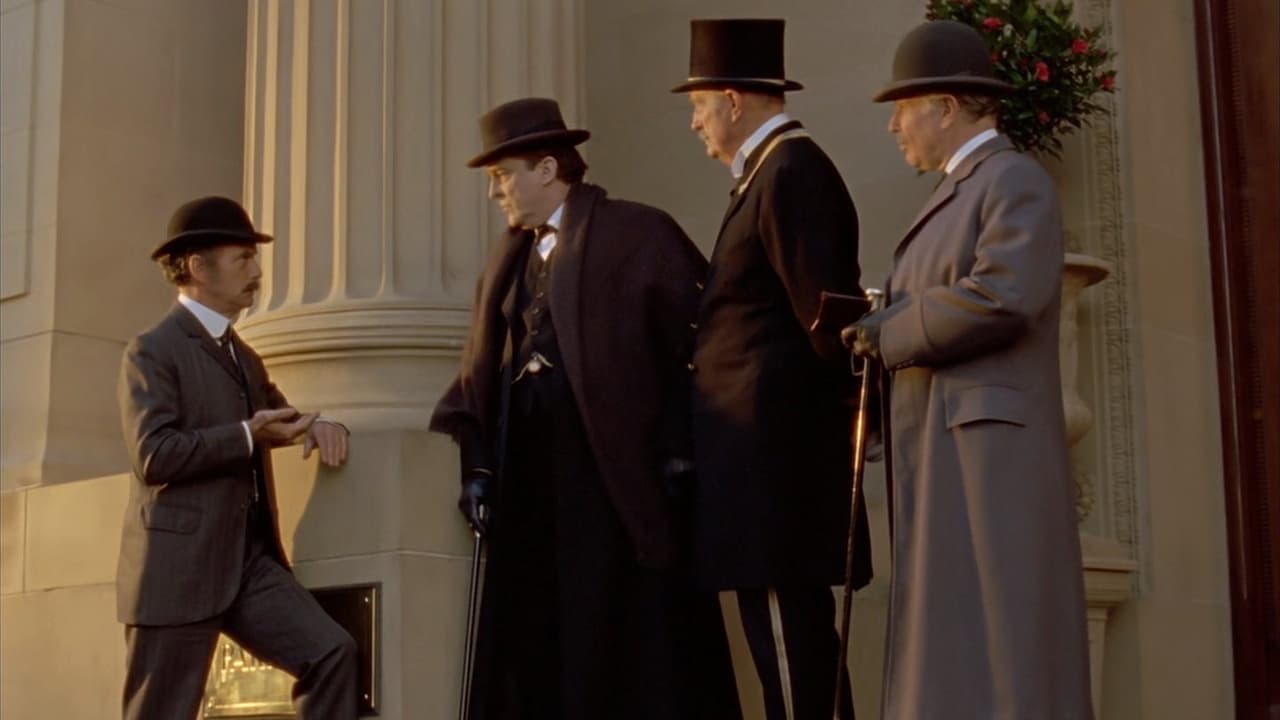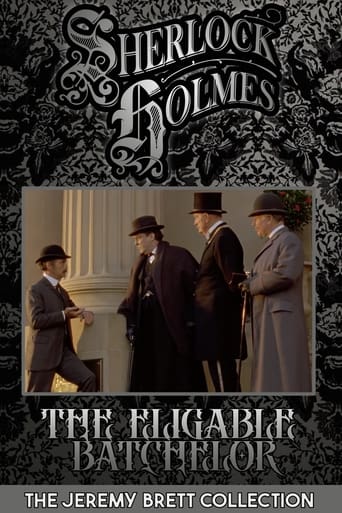



People are voting emotionally.
Excellent, a Must See
Excellent characters with emotional depth. My wife, daughter and granddaughter all enjoyed it...and me, too! Very good movie! You won't be disappointed.
View MoreIt's a good bad... and worth a popcorn matinée. While it's easy to lament what could have been...
View MorePutting it simply, I don't agree with those who think this film is one of the weakest of Jeremy Brett's Sherlock Holmes adaptations or that it has no merit whatsoever. I can understand why it isn't especially well-liked by fans but I think some of the ire is unwarranted. The first issue with the episode is that it is a loose adaptation of The Adventure of the Noble Bachelor. If the only reason you watch this series is to see close adaptations, you'll probably be disappointed, but I recommend giving it a chance anyway. As a film, it has a lot to recommend it. The presentation is sophisticated and sumptuous. Gloven, one one of the main settings, is beautiful. The sequences introducing the title character, Lord Robert (Simon Williams) and Hettie (Paris Jefferson) are beautifully acted and filmed. I'm almost certain it was designed to appeal to drama-lovers. There are expansive views of the estate, glistening sunlight-on-water shots, clever panning shots to pull us into the next section. Williams and Jefferson are also standouts among the episode cast. These shows always had excellent actors and Paris Jefferson is especially powerful for me as Hettie, who most definitely is not a damsel in distress. When Lord Robert teases that she's more "wild and beautiful" than a great cat, he ironically does not realize how true that is.While the film has been called both boring and confusing, I'd take issue with those. "Confusing" I can understand. Especially in the first third or so, you could say some parts are disjointed. I think we're purposely being fed scraps of information. "Boring" is the last word I'd use. I guess it doesn't move quickly, but for me it's a comfortable pace that allows the story to unfold and the viewer to absorb the things happening on screen. There are one or two sequences that are a bit shoehorned but they are minor to some other pretty effective editing choices. Such as the sequence of events on Holmes' night out or intercutting the wedding with Holmes in his flat.Speaking of Holmes, I think Jeremy Brett is tremendous here: one of his finest performances as Holmes, however out of sorts the character may be--not a moment gone amiss. Some people think Brett is theatrical, affected, flamboyant, over the top, and so on. Guess what? He is and it's a style that, by the this point, he had, for my tastes, honed to perfection. It's evident to me that there's an incredible depth and intensity emotion that Brett drew upon in these performances. His depth shines on through as Sherlock's depth.Regarding acting, props also to Anna Calder-Marshall, who has a strong dual role playing sisters. I'm not sure why she was cast in both roles (other than saving money) but it's done cleverly, as the actress's appearance is obscured for different reasons for both characters. Really, the whole cast cast is strong except for the man playing Hettie's love. Although he only appears briefly, he seems lifeless. I doubt he was/is authentically American. Maybe he was more preoccupied with the accent than the acting.Contrary to some other reviewers, I would definitely recommend Holmes/mystery/film fans give this film a fair try, with as little clouded judgment from negative reviews as possible. Sure, it's weird; what's wrong with that?
View MoreI read a few of the reviews here before watching this for the first time. I adore Jeremy Brett as Sherlock Holmes, and all of the adaptations this company made of the original stories by Conan Doyle. I saw "The Last Vampyre" (not from Conan Doyle) and thought it stupid and silly. So I was prepared to dislike this one, also a late entry in the series.It takes some getting used to. There are odd interpolated scenes that don't seem to make any sense. There are foreshadowings and flashbacks. There are a lot of extreme closeups. There are also brilliantly constructed scenes with impressive lighting effects. It's very non-linear and often puzzling.The overall effect? I'm impressed. All the strange scenes make sense at the end, even granting, upon rational reflection, that the ending is perhaps a bit unlikely. This is a superbly crafted, acted, and presented film. It is a worthy addition to the Canon, and a triumph by Brett and Edward Hardwicke. By all means, give it a shot. Don't be dissuaded by the negative reviews. This is truly a great Sherlock Holmes mystery.henry
View Moreho hum,this is the last (i believe) of three episodes that i have found of the Shelock Holmes Adventures featuring the excellent Jeremy Brett & as every minute goes by,i am watching what i consider to be Jeremy Brett's last performance. A lot of screaming,hysterical women in this episode.More than usual.Why can't they just accept that they are wrong & leave it at that?Not worthy of mine or Sherlock Holmes attention. The dream sequence,is it true?If a brain lies numb for a length of time can it see into the future?If drugs played a part as some sort of amplifier for the brain then maybe.Geronimo,who was at one with the land & done a lot of pipe smoking had visions. As the plot unravels before my very eyes i cannot help but be riveted to the spot by Jeremy excellent performance. At the end of the show,where they are sitting in the opera box & one of the ladies thanks Sherlock,the cameras zoom out slowly & credits start to roll.I think was that thanks worthy of the great Sherlock Holmes?Who's presence had so much effect on the outcome of the case.But wait,thinking about it,Sherlock Holmes did not really play much part in concluding the events.He did manage to solve the case but it would have solved itself if Shelock had just stood back. An excellent performance (i say again) by Jeremy Brett,a joy watching Shelock Holmes living & breathing once more.
View MoreThis episode of the Jeremy Brett "Sherlock Holmes" series was the worst in terms of being a bloated two hour reconstructed story. Despite good work by Brett, Edward Hardwicke, and Simon Callow, it again demonstrates how the writers of a screenplay can wreck the work of a better writer.THE ADVENTURE OF THE NOBLE BACHELOR appears in the first collection of Sherlock Holmes short stories, THE ADVENTURES OF SHERLOCK HOLMES. The story details how Holmes and Watson get involved with tracing the whereabouts of a young American woman, the daughter of mining millionaire, who was about to marry one Lord Robert St. Simon, a man of impeccable breeding and background - one of the most available high profile aristocrats in the marriage market. The young woman (Alice Doran) disappeared at the chapel where the marriage was about to commence. The police (Lestrade in charge again) are suspicious of the antics of a former girlfriend of Lord Robert, who may have threatened the missing bride. And then there is also a mysterious man who was seen near her hotel on several occasions. Holmes, in the end, is able to figure out what exactly happened, although it does not please his client. Now Lord St. Simon appears to be a well-mannered, self-important jerk in the story, but he gives no indications of being the conniving monster that was created by the scriptwriters. They turn him into a violent version of Edward Rochester, with a still living wife hidden in the ancestral house, in squalor (similar to Bertha Mason Rochester in the attic in JANE EYRE). He is a fortune hunter who marries and gets rid of wives (so why not the first one?). The conclusion of this film is about as far off base as one could get from the short story, which ends on a friendly note.When he wrote THE NOBLE BACHELOR, Conan Doyle was making subtle comments about a trend of his time.SPOILER COMING UP:Alice turns out to have been reunited with one Francis (Frank) Hay Moulton, a young American who prospected near her father in California, but had no luck. Mr. Doran (when he struck it rich) would have nothing of Moulton, pulled Alice away to Europe, and decided to buy a title for his daughter. It was very common in the "Gilded Age" for multi-millionaires in America to marry into French or British aristocracy. The best recalled marriages were of Consuelo Vanderbilt to the Duke of Marleborough, and of Jennie Jerome to Lord Randolph Churchill (the latter producing Winston Churchill). Anne Gould married Count Boni de Castlelaine. The trend continues to this day (Jackie Kennedy Onassis' sister Lee Bouvier becoming Princess Radziwell of Hungary). But it was at it's height in the 1890s - 1920s. Conan Doyle was poking fun at this ridiculous right of passage of a new snobbish American aristocracy, and showed that Lord St. Simon really was not worth the trouble (when he learns the truth St. Simon will not congratulate the Moulton's on their marriage). Conan Doyle ends the story with Holmes demonstrating a better approach to good international relationships, in a memorable comment suggesting that one day the memories of the idiots who caused the American Revolution will fade and Britain and the U.S. may yet be reunited again.As I have said before, Conan Doyle could write the heads off of some screenplay writers.
View More